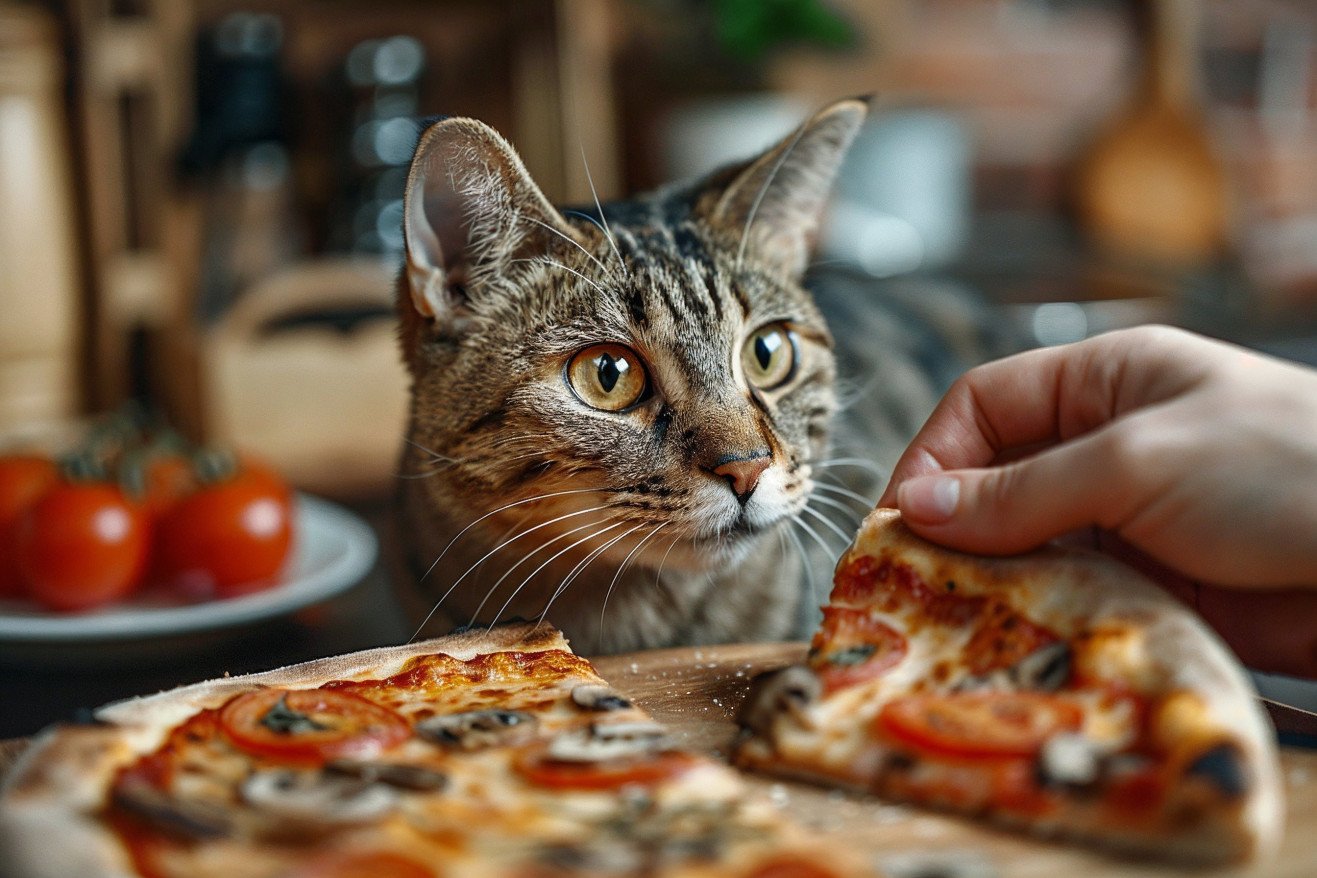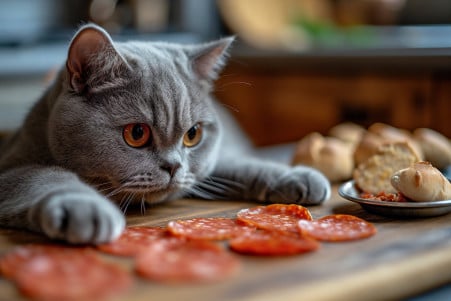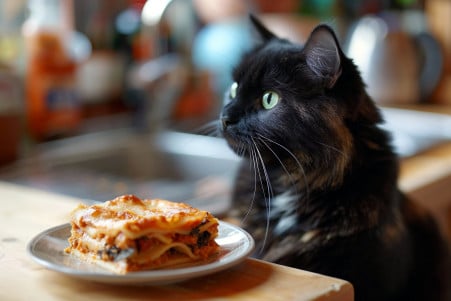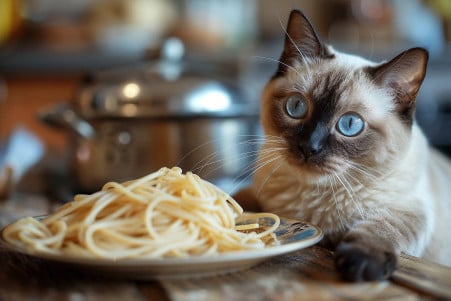Can Cats Eat Pizza? Understanding the Risks and Alternatives
29 February 2024 • Updated 27 February 2024

While pizza may be one of the most delicious foods for humans, what does it mean for your cat’s diet? Cats cannot eat pizza because it is high in fat, lactose, and contains several toxic ingredients like onions and garlic. In addition, the high levels of carbohydrates and salt can lead to digestive problems and obesity. Stick to treats that are safe for cats to make sure that you are keeping them healthy.
As we go through the reasons why pizza is not good for cats, we will cover a variety of veterinary perspectives and nutritional research. These perspectives and research will cover the unique nutritional requirements of cats, the dangers of feeding them human food, and the health risks of lactose intolerance and toxic ingredients.
We will also cover cat metabolism and other healthy dietary options to make sure that your furry friend is as healthy and happy as possible.
Can cats eat pizza?
Knowing the Basics of Feline Nutrition
Cats are more than just cute, cuddly friends. They are obligate carnivores, which means they have a biological requirement for a specific kind of diet. According to the Cornell University College of Veterinary Medicine, the ideal diet for cats is high in protein, low in carbohydrates, and moderate in fat.
Proteins are essential for a cat’s body, providing energy and helping to maintain the immune system, while fats are important for vitamin absorption and skin and coat health.
Commercial cat food is formulated to meet these exact nutritional needs. On the other hand, pizza, which is a favorite food of many people, is not nutritionally valuable for cats. The crust of the pizza is especially problematic because it’s high in carbohydrates, which can lead to obesity and other health problems in cats when it’s eaten in large amounts.
The bottom line is that pizza, and other human foods, don’t meet the nutritional needs of cats and can lead to health problems and malnutrition.
While giving pets human food can be seen as an act of love, it’s not a good idea to give cats pizza because it can cause them to become sick. Instead, feeding cats specially formulated cat food will ensure they get the balanced diet they need to stay healthy and happy.
Toxicity: The Ingredients in Pizza That Are Bad for Cats
There are a few ingredients in pizza that can be toxic to cats. Onions and garlic, which are often used to flavor pizza sauce, are especially dangerous. Not only can they cause gastrointestinal upset, but they can also cause the destruction of red blood cells, leading to hemolytic anemia. Weakness, loss of appetite, pale gums, and even changes in urine color are all signs of this serious condition, according to Hill’s Pet.
In addition, According to Litter-Robot, the dough that pizza is made from is toxic to cats. The yeast in uncooked pizza dough can expand in a cat’s stomach and ferment, leading to alcohol poisoning. This can be fatal if the cat ingests enough alcohol. Meanwhile, while cooked pizza crust is not toxic to cats, it doesn’t have any nutritional value and can only be consumed in moderation.
While seasonings and flavorings may not seem like a big deal, they can also be toxic to cats. For example, The Parkway Veterinary Emergency Clinic notes that the herbs and spices, including chives and sage, used to season turkey, a common pizza topping, can be toxic to cats.
If your cat has eaten pizza or any of the ingredients listed above, contact your vet immediately. While it may take time for symptoms to develop, getting treatment early can help prevent more serious complications. Cat owners should also be careful about what they feed their pets and avoid giving them foods that are safe for humans but toxic to cats.
Why Are Cats Lactose Intolerant?
Most cats are lactose intolerant after weaning because they lose the ability to digest lactose as a result of a decline in the enzyme lactase. As a result, Hill’s Pet explains that lactose consumption can cause digestive problems, including diarrhea and other stomach issues.
Cheese, a common pizza topping, is especially problematic for cats who are lactose intolerant because it can cause digestive upset and, if not carefully managed as part of a balanced diet, contribute to obesity.
While some cats may be able to tolerate dairy products without immediate side effects, WebMD explains that the potential for long-term health issues means that dairy is best avoided. While manufacturers have created alternatives like specially formulated ‘cat milk’ products, these are high in calories and should be given sparingly.
According to Zoetis Petcare, cats may be attracted to the fats and proteins in dairy, but lactose-free options or small amounts of cultured dairy products are better choices for occasional treats.
It is important for cat owners to make sure that their cats’ diets are lactose-free, which is important for their cats’ health. For cat owners who want to treat their cats, it is important to know how to recognize and avoid lactose while providing treats that won’t cause digestive upset and will help maintain their cats’ health.
Cat Digestion and Why Cats Can’t Eat Pizza
Cats have a number of digestive and metabolic adaptations that are specific to their carnivorous diet, which is why a high-carb food like pizza isn’t a good choice for them. Research published in PLOS ONE shows that the wild ancestors of domestic cats ate prey that was very low in carbohydrates, and this has led to their metabolism and physiology being adapted to a diet that’s made up mostly of animal tissues.
As a result, cats have a limited ability to digest starch due to low levels of intestinal amylase, an enzyme that’s necessary for the digestion of carbohydrates.
The liver is also important for metabolism in cats, and research published in the Journal of Animal Science and Biotechnology shows that cats have a higher capacity for gluconeogenesis, which is the creation of glucose from amino acids, than other animals, including dogs. On the other hand, cats have a limited ability to store glycogen and low hepatic glucokinase activity, which is the enzyme that’s responsible for glucose uptake.
When cats are fed a diet that’s high in carbohydrates and fats, it can lead to obesity, diabetes mellitus, and a disruption in their natural macronutrient intake.
These problems are made worse by high levels of carbohydrates because instead of being absorbed as glucose, they’re fermented by microbes in the colon, which can lead to gastrointestinal problems. This makes it important to feed cats a diet that’s in line with their obligate carnivore status to ensure their health and metabolic well-being.
How to Spoil Your Cat Without Feeding Them Pizza
Of course, when it comes to treating your cat, it’s important to make sure that you’re doing so in a way that’s healthy for them.
A suggestion from Litter-Robot is to give your cat healthy, nutritious treats that are tailored to their dietary needs, such as cooked, lean proteins like salmon, turkey, or skinless chicken. These treats are high in protein and provide the nutrients that your cat needs without the unhealthy extras that come with pizza toppings.
These proteins are especially good because they’re high in amino acids and usually low in preservatives and seasonings that can be harmful to cats.
For a quick option, store-bought cat treats can also be nutritious if you choose the right ones. According to Waggle, cat treats that are specifically made for cats can be a good source of both fun and nutrition as long as they’re given in moderation to avoid weight gain.
That said, the most important thing to remember when it comes to keeping your cat healthy and happy is to make sure that you’re giving them a balanced diet. Treats should only be used to supplement your cat’s food, not replace it.
Vets recommend that cat owners talk to their vet to make sure that the treats they’re giving their cat are in line with their specific dietary needs. As always, the old adage of everything in moderation applies to the treats we give our pets.
Final Thoughts: Why Cats and Pizza Don’t Mix
In conclusion, pizza is a triple threat to cats when it comes to their nutritional needs. It’s high in fat, full of lactose, and it often contains ingredients that are toxic to cats, like onions and garlic. All of these things are not only bad for cats but can be dangerous to them as well.
The high-carb crust is also nutritionally void and can upset a cat’s stomach, which is especially likely if the cat is lactose intolerant, which many are.
This discussion really drives home the point that it’s important to know what cats need from their diet. Cats are obligate carnivores, which means they need a diet that’s high in protein and low in carbs, which is the exact opposite of pizza. As a result, it’s up to cat owners to make sure that the food they give their cats meets these needs so that they can be healthy and happy.
It’s important to keep in mind that the best way to keep a cat healthy is to make sure that their diet meets their species-specific needs. By making sure that the food and treats we give them are safe for cats, we can avoid the dangers of feeding them things like pizza and help them live long, healthy lives.


